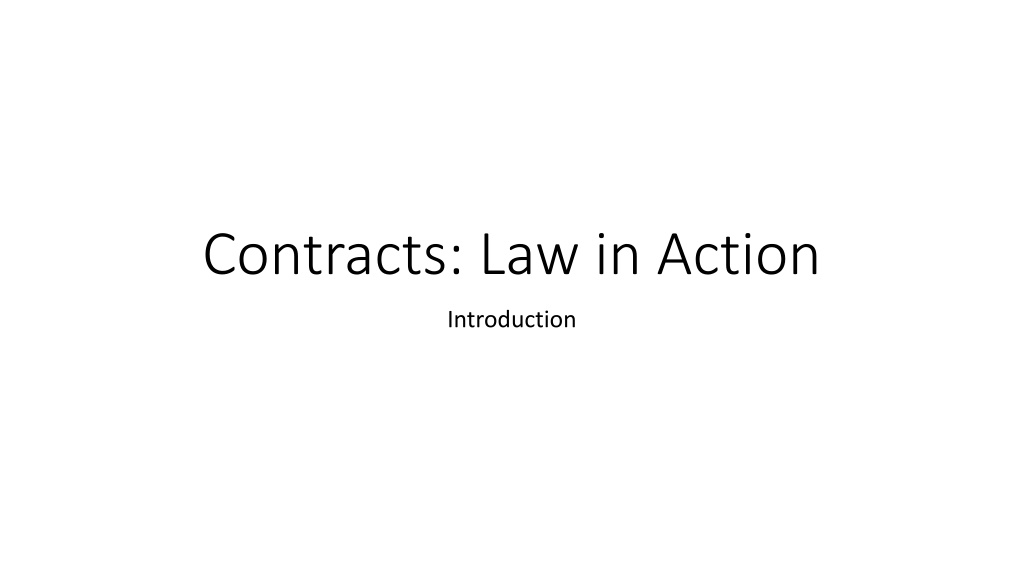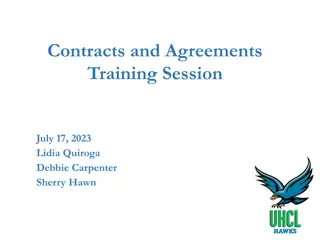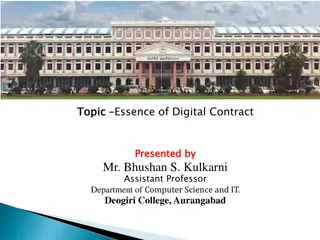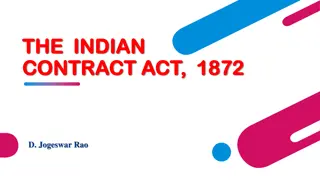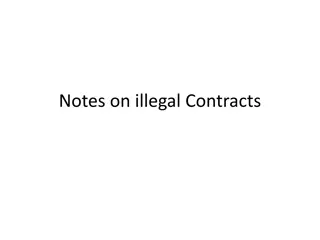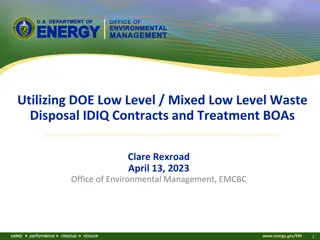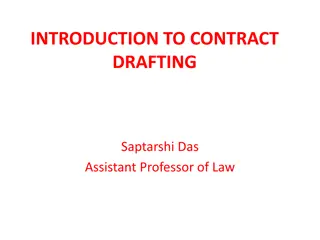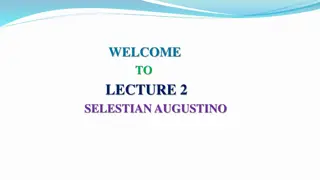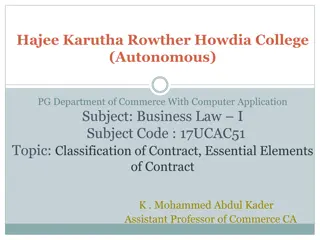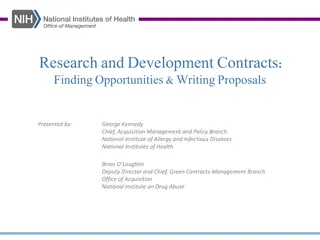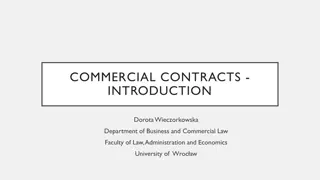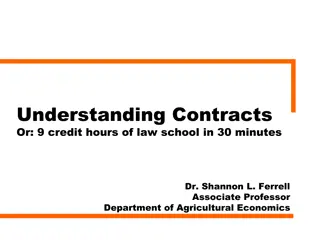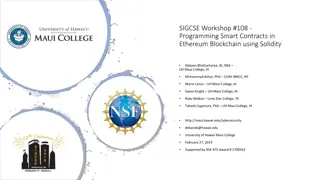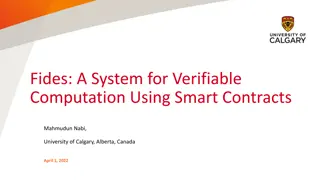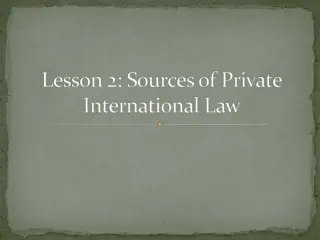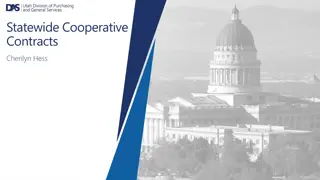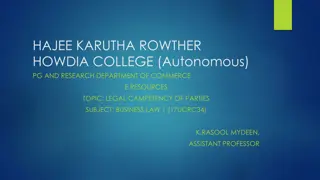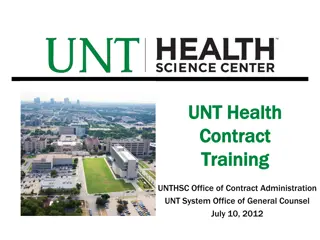Understanding Contracts Law in Action
Explore the intricate world of contracts law through the lens of real-life applications and empirical insights. Delve into the nuanced interactions and influences that shape legal decisions, with a focus on the interplay between public and private actors. Gain a deeper understanding of the complex dynamics at play in the legal system and the multifaceted roles lawyers undertake beyond the courtroom.
Download Presentation

Please find below an Image/Link to download the presentation.
The content on the website is provided AS IS for your information and personal use only. It may not be sold, licensed, or shared on other websites without obtaining consent from the author. Download presentation by click this link. If you encounter any issues during the download, it is possible that the publisher has removed the file from their server.
E N D
Presentation Transcript
Contracts: Law in Action Introduction
Housekeeping On call policy 1st2 weeks anyone. Thereafter, only half the class. Before the third week, you will know to which group you are assigned. Bring your tent cards with you every class. So long as I can read from a distance your signifier and last name, you may personalize the card as you wish. (Of course, we all will judge you, with kindness) Website: https://contractslawinaction.law.miami.edu/
My 3 x 5 index card My 3 x 5 index card On the blank side, please write your preferred signifier and last name. On the lined side, answer the questions: (1) What did you study before law school? Advanced degree? What know-hows do you have? (2) Think about a profound or influential experience. Be present with it. Don t describe the experience. Fill in the sentence: I hope that my legal career (3) The practice of law, public and private, is a personal service business. You serve clients; you sell yourself. There are many lawyer-client relationships. Which types of clients do you want to serve? (4) Before you turn in your card, near the end of the class, Choose a number 1,2,3, or 5. #4 cannot be chosen. Which questions of contract law speak to you?
The Empirical Background to Contracts: Law in Action 1. Law is not free. 2. Law is delivered by actors with limited resources and their exercises of discretion by influenced by their specific interests, including those that emerge from their social entanglements. 3. Other institutions also make legal-like judgments, and there they compete with the specifically legal system and consequently there are many approaches to how public and private are distinguished. Public and private actors have relationships with each other. by alternative institutions, and there is a great deal of 4. People, acting alone and in groups, cope with law and cannot be expected to comply passively with public law. 5. Lawyers play many roles other than adversary in a courtroom. 6. Our society deals with conflict in many ways, but avoidance and evasion are important ones. 7. While law matters in American society, its influence tends to be indirect, subtle, and ambiguous.
2. Law is delivered by actors with limited resources and their exercises of discretion is influenced by their specific interests, including those that emerge from their social entanglements.
3. Other institutions also make legal-like judgments, and they compete with the specifically legal system and consequently there are many approaches to how public and private are distinguished. Public and private actors have relationships with each other.
4. People, acting alone and in groups, cope with law and cannot be expected to comply passively with public law.
5. Lawyers play many roles other than adversary in a courtroom.
6. Our society deals with conflict in many ways, but avoidance and evasion are important ones.
7. While law matters in American society, its influence tends to be indirect, subtle, and ambiguous.
The Structure of the Common Law Duty Breach Remedy Duty Defense to whether the court should enforce the Duty Breach Remedy Duty Breach Defense to whether the court should should find a breach remedy The Five Fingers of Contract Law (1) Duty (2) Defense to whether the court should enforce the Duty (3)Breach (4) Defense to whether the court should find a breach (5) Remedy
(1) Duty Creation Stories Torts are duties owed to strangers. Think car accidents. [How does tort law respond or fail to respond when the parties are not strangers?] (legal malpractice?) Contracts is about creating duties with others. Think about the various ways in which people make commitments. Are you in a relationship? Is it not yet one? What makes it one? In what ways can you rely on the other? Is it easy to get into a relationship? Think about the various ways in which people avoid and evade committed relationships. Think about alternatives to legal commitments. Think about differences between relationship-types. Think about their similarities.
(2) Defense to whether the court should enforce the Duty The Litigator Let s take a second look at the parties at the time that the relationship was created (the contractual duty was created). Parties form relationships with different interests and abilities. Various forms of power are at play. People and groups make mistakes, are misled, and are vulnerable. As these are always present when should they suggest that the court should not enforce the duty? In the US, when should the social entanglements of power protect those with less social resources? What assumptions does contract law make about the parties to the agreement? E.g., their state of mind, their intellectual capacity, their ability to decide for themselves
(3) Breach Performance or non- Performance The Drafter What was agreed? Was that performed? If there was not compliance, how serious is it? Can the breach be repaired? Should the court normalize less than perfect compliance? How do we respond to the explicit? How do various manifestations express particular commitments? How explicit must one be about one s duties and rights? Similarly, for the implicit manifestations. How should parties act at the time the duty is formed to create justified expectations and reliances? Role of the Lawyer. Who bears the costs of the contract? E.g., overall society, distributive consequences, negative externalities
(4) Defense to whether the court should should find a breach The Historian What are the costs to the parties of finding a breach? How has the relationship between the parties changed since the contract was created?
5. Remedy The Opposable Thumb Law is not free. Obtaining a judicial remedy is costly. Not just in dollar and cents. Obtaining a judicial remedy can be evaded and avoided. Lawyers can play more than an adversarial role in settlement negotiations. Since settlements are usually contracts, the threats of (2) Defense to Duty, at least, impose other norms on lawyers. What does it mean to be compensated for a breach of trust? People have different hopes and expectations. When and how should they be compensated for their not becoming real? There are non-legal sanctions. Should we spend public resources deciding this dispute? Roles of the judiciary.
The 5 Fingers of Contract Law Why fingers? Not ignoring differences between people, five to me suggests a hand. Each finger puts to play different evidence and arguments. They often point at different things. They invoke different values. As I ve been suggesting, they take the form of stock characters and appeal to different character traits. Choose one that you want to try on for this semester. When you are on call, I may ask you for that perspective s view of the matter. Your ability to take that perspective will develop as you learn its related laws.
While law matters in American society, its influence tends to be indirect, subtle, and ambiguous.
Approaches for Understanding Law Law is neutral emphasis on process (ignoring transactions costs) Law and economics, i.e. Chicago school macro efficiency (ignoring market structuration) Law in action real-life experience (ignoring political structuration) Critical legal studies distributive consequences (ignoring personal structuration).
